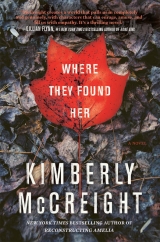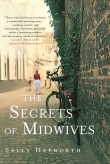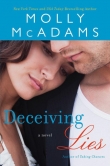
Текст книги "Where They Found Her"
Автор книги: Kimberly McCreight
Жанры:
Триллеры
,сообщить о нарушении
Текущая страница: 11 (всего у книги 20 страниц)
MOLLY
MAY 18, 2013
What I told Dr. Zomer was not the whole truth. I didn’t even tell Justin that. But I think he knew. Of course he did.
I did drop a glass and I did slip and cut my hand a little when I was trying to clean it up. That’s all true. But when I saw the blood on my hand, I didn’t feel upset or worried. I felt relieved. Like the world had been rebalanced.
I don’t even remember picking up the piece of glass that I cut my arm with. But I did. I must have. I do remember being careful not to cause any real damage, in my nonexpert medical opinion. Because I could have if I’d wanted to. I could have done so much more.
And then Ella started to cry—one of her night terrors. And so I ran to her without thinking, because I could do that by then, comfort her after a bad dream. I didn’t realize how much that small cut was already bleeding.
I had Ella in my arms when Justin came home a few minutes later. As soon as he saw us, he started yelling: Where’s she bleeding? Where’s she bleeding? It wasn’t until I looked down that I saw Ella’s head was covered in blood.
A second later, I passed out. Luckily, Justin caught me—and Ella, thank God—as I fell. Next thing I knew, the paramedics were lifting me into the ambulance. Halfway to the hospital, they realized that the cut to my arm wasn’t serious. That I’d passed out not from blood loss but from the sight of it all over my daughter.
Justin lied and told the paramedics that he had been there, seen the whole thing. That it had been an accident, me and the broken glass and my arm. And watching Justin do that for me, lie like his life depended on it, like my life depended on it—and it might have, they could have hospitalized me against my will—I have never loved him more.
And so when he’d insisted the next day that I go see Dr. Zomer, I went. It was the least I could do.
Molly
“I got you a latte,” Stella said when I got to the Black Cat. She was at a table by the window, two coffees already in front of her. “Full-fat milk, of course. Because that’s all they serve in this godforsaken place.” Her nostrils flared. “Honestly, I don’t understand why you like it here.”
“It reminds me of the city,” I said as I sat down across from her, trying not to think of the box of files I’d had Steve leave in our living room. The box that was left by some stranger. A reader, maybe, but an angry one? A happy one? Who was to say? Thinking of it still inside my house filled me with dread. I wasn’t sure that I’d done the right thing, not reporting it as a crime.
I’d gone back inside after Steve left, but only long enough to get Ella dressed and to change out of the yoga pants I’d slept in. I’d deliberately avoided looking at the box. After Ella was safely at school, I’d planned to go home and look inside. Except now I was doing my damnedest to avoid the house. I was so stressed about the whole thing, I was even tempted to tell Stella. But that box was exactly the strange turn of events she lived for. She’d have us rushing back to my house to go through every last page.
“Cockroaches would remind you of the city, too, you know,” Stella went on. “But that doesn’t mean we need to start importing them. Oh, wait, I didn’t tell you, did I?” She leaned forward conspiratorially. “Zachary and I are having lunch after my lesson today.”
“Really?” I was relieved to be talking about something silly like Stella’s endless—but largely halfhearted—pursuit of her thirty-one-year-old tennis coach. It gave me an excuse not to ask the questions I had about Rose and her baby and Aidan. I wasn’t sure I was ready for the answers.
I startled when my phone buzzed on the table.
“Wow, jumpy much?” Stella asked, intrigued. “Who is it?”
Richard Englander. I was surprised it had taken Richard all the way until nine thirty to call me again. It was his third call. There had also been a couple of texts. He was back in the office and wanted in on the biggest story that had hit Ridgedale in years. In fairness, it would have been his if he hadn’t been out. His first message, the night before, had been nice—just checking in to see if I needed any help. But each one had gotten more insistent. I let his call go straight to voicemail, fairly certain I’d never listen to the message. And absolutely sure I wasn’t giving him the story back. Not unless and until Erik made me.
“So you were saying: lunch with Zachary?” I turned back to Stella. “Really?”
“Wait a second, don’t try to change the subject.” She pointed a finger at me. “What’s wrong? Who was that?”
“It was just that guy, the other reporter from the Reader. The young one.”
“The asshole?”
“Yes, him. He’s the news reporter. The baby would have been his story if he hadn’t been out sick,” I said. “He wants me to hand it over.”
“Screw him,” Stella said. “You’re doing a great job. I read that piece of yours this morning about—what’s it called—neonaticide. It was really . . .” She searched for a word. “Impassioned.”
“Yeah, well, it would definitely make Justin happy if I let Richard take over.”
“Oh yeah?” She paused, pressing her lips together. I could always see Stella bracing to pounce whenever I complained about Justin, which was why I never did. She loved to bitch about husbands—ex, current, prospective, it didn’t matter.
“He’s worried I’m going to have some kind of breakdown because it’s about a baby.”
Stella stared at me for a long time, her expression unreadable. “Are you?” Her tone was matter-of-fact. As though, yes, a calamitous mental breakdown was always a possibility, just an utterly unremarkable one.
And that was why I loved her.
“No,” I said. Not only did I mean it, but it felt true. “I’m really not. I know it doesn’t make any sense, but I actually feel better than I have in years.”
“Then, as your friend, I say you need to do it,” Stella said with unusual seriousness. There was an unfamiliar look on her face, too—sincerity. “Regardless of what makes sense. And notwithstanding what Justin wants.”
“Right, screw the damn husband,” I said with a gentle smile. I didn’t think that was what Stella meant, but she could be flip about marriage.
She looked wounded. “I’m just saying sometimes there are things you need to do, no matter what anyone says about it.”
“So what ended up happening with Rose?” I asked, knowing it was time to change the subject. And I needed to clear the air. My suspicions were surely ridiculous; they felt ridiculous. But a little proof would be nice. “You know, the police called me looking for her. And you.”
“Yes, apparently I needed permission to take my aunt to the Philadelphia Flower Show.” Stella didn’t seem the least bit surprised or concerned. “Anyway, Rose took off. I told the police that. And can you blame her? They will eventually figure out that it wasn’t her baby, but in the meantime, why should she stick around while they harass her? Anyway, I don’t think that’s why she left. I think it was the baby’s father. She told me she wasn’t on her way to work when she got into that accident. She was leaving town. She wouldn’t tell me details, but I think she was scared.”
“How can you be sure she’s okay? Have you spoken to her?”
“Are you saying you think I lied to the police when I said I didn’t know where she went?” Stella asked with exaggerated offense. “Working on this story has made you awfully suspicious, Ms. Sanderson.”
“I’m just saying, what if the baby’s father came and took her from the hospital?”
“That’s what you’re worried about, Rose’s safety?” Stella asked. She could tell I wasn’t convinced Rose was in the clear. Stella was hard to manipulate. “That baby is not Rose’s baby. Didn’t they say it was a newborn? Rose’s baby was at least three weeks old. And she wasn’t a small baby.”
“Approximately newborn,” I clarified. “I don’t think they know for sure.”
“Well, well, you’ve certainly drunk the Kool-Aid,” Stella said. “You sound just like them, Molly. And I don’t mean that as a compliment.”
Before I could defend myself—and it would have been a lame defense—Stella was distracted by a text.
“Great,” she said. Then she spoke aloud at an annoyed clip, the contents of the response she was typing. “Why aren’t you in school, Aidan?” She shook her head and looked up at me. “You’d think he’d know enough not to text me when he’s supposed to be in class. Aidan’s crappy behavior might bother me less if it didn’t always make him look so damn stupid.”
“Sounds like things are the same with him, then.”
Aidan. The flower girl. I could still hear Ella’s little voice: What’s a slut, Mommy? There was surely an explanation. I just needed to hear it. And I needed to figure out a way to get Stella to tell me without having to ask her outright. Because I liked Stella, and I wasn’t sure our relationship could survive that kind of direct accusation.
“Things with Aidan never change.” She shrugged, frowned. “I just have to accept that I have no control over what he does. Maybe Aidan will end up fine, and maybe he won’t. That’s terrifying, but it’s also reality. I can’t drive myself crazy waiting to see how he’ll turn out.”
“Maybe he needs a girlfriend,” I said. “You know, somebody to keep him in line.”
“Bite your tongue,” Stella said. “The one thing—probably the only thing—we have going for us is that Aidan doesn’t have a girlfriend.”
When I got home, I stood in the open door, staring down at the box, afraid to open it. Finally I crouched down and jerked off the lid as if ripping off a Band-Aid. My pulse was racing when I looked in, but Steve had been right, just some ordinary files.
I pulled one out at random. It was for a girl named Trisha Campbell from 2006. Inside were photocopies of a hodgepodge of Ridgedale University records—transcripts, dorm information, food-plan data. Trisha had been a good student, a double major in English and history who’d studied in Spain her junior year. I had Trisha’s file open in front of me as I pulled out another, this one from 2007. A girl named Rebecca Raynor. Inside was a slightly different mix of records. Rebecca had been a biology major with less impressive grades but several awards for music achievement. I put Rebecca’s file next to Trisha’s. Then I saw a name I recognized: Rose Gowan, 2014.
When I looked back at Trisha’s file, sure enough, there it was: VW, in the middle of her senior year. Rebecca had voluntarily withdrawn as well. As it turned out, every one of the students in that box—six, all female—had withdrawn voluntarily from Ridgedale University. One in 2006 and two in 2007, the remaining three from 2012 to 2014. The only obvious connection I could find was between the three girls who’d withdrawn in 2006 and 2007: They’d all taken the same American studies class, taught by a Professor Christine Carroll. Otherwise, the remaining girls’ schedules and backgrounds were completely different.
I rushed out of the house, gripping the box of files, intent on confronting Director of Security Ben LaForde. But as I drove toward campus, I began to wonder what I was confronting him about. A series of improperly investigated sexual attacks on campus that led half a dozen women to leave school—that’s what I was thinking. I felt sure that Ben LaForde was hiding something. But what proof did I have?
Six young women had withdrawn from Ridgedale University in about a decade. What was an average rate at any university? Perhaps many male students had withdrawn as well. There was no note in the box of files, nothing to explain what their assemblage meant. My theory was based largely on the fact that Stella suspected Rose Gowan had been raped on campus and then withdrawn. It was something of a leap to assume that the box implied that the same bad thing had happened to all the other girls.
By the time I’d reached campus, it had occurred to me that I would at least need some evidence the assaults happened before I started making accusations. Instead of parking and heading for LaForde’s office, I circled back toward home, taking the long way past the Essex Bridge.
I was struck with unexpected sadness when I saw only a single police car parked along the road near where the baby had been found. As though everyone else had already given up. Forgotten. Moved on. I slowed as I rolled past, but the officer in the car didn’t look up, his eyes locked on a cell phone. When I was a few yards past him, I noticed the driveway across the street, tucked between a couple shaggy trees. It curved right, to a run-down ranch house with a clear view of the road and the near side of the creek.
I jerked my car left and into the driveway. Surely the police had interviewed whoever lived there. But that didn’t mean I couldn’t also.
The house was more decrepit up close, the edges of the foundation disintegrating into the lawn, a rusted gutter unhinged, a garage window cracked, a lopsided shutter. The lawn was all crabgrass and tall weeds, mostly brown from winter, with a crumbling flagstone path leading up to the front door. There was a threadbare flag beside the front door. Even the house numbers had shifted, revealing rusty shadows in their wake.
I knocked hard, rattling the screen. I waited a minute with no response, then counted to twenty before knocking once more. There was a truck in the driveway, but that didn’t mean anyone was home. I took a couple steps to the side, thinking about heading back to my car, when suddenly the front door opened.
“Hello?” an angry-sounding man shouted through the screen door. “Who’s out there?”
He was big, tall and heavy if not quite overweight, with a head of straggly gray hair and a very large face. He was wearing pajama pants and a snug black T-shirt with a big Nike swoosh on the front. It hugged his big belly like a fabric sack.
“Oh, hi,” I said, stepping forward so he could see me, even though I wasn’t sure I wanted him to. “I’m Molly Sanderson, a reporter with the Ridgedale Reader, and—”
“A reporter, huh?” He sounded intrigued. “What do you want?”
Nothing, I thought of saying. So I’ll just be going now.
“I’m working on a story about the baby they found across the street,” I began. What if he’d had something to do with it? It wouldn’t be the smartest thing in the world to dump a dead body across the street from your house. Then again, he didn’t seem like the most thoughtful fellow. “I was hoping I might talk to you for a minute.”
He narrowed his eyes, then pushed open the door with one meaty hand. “You coming in or not?” he asked when I didn’t move forward.
“Oh, yes, thank you,” I said, stepping inside.
Since when was it safe for me to go into the house of a huge man I did not know, an angry, possibly unstable man who, despite his age, could have easily overpowered me? Was this really the best use of my rediscovered moxie? For all I knew, that baby belonged to some poor woman this guy kept locked in his basement.
Fueling my fears was the overwhelming smell of rot, which smacked into me the second I stepped inside the house. Cat feces mixed with garbage, maybe? Hopefully, in fact. That was much better than the many other options that had jumped to mind, like death. I tried to breathe through my mouth so I wouldn’t gag. But the filth in the air was palpable. I could feel it gathering in a sour blanket over my tongue.
It was dark, too. The curtains were pulled shut, the only light from a single standing lamp in the corner. Not dark enough, unfortunately, to hide the mess. There were boxes overflowing with clothes and papers and dusty Christmas decorations, and stacks and stacks of old magazines. In the open kitchen beyond, I could see dirty dishes and open food packages covering every available surface. An orange tabby cat was sitting in the center of the cluttered stove next to half a dozen industrial-size bottles of moisturizer. There were three more cats in a circle on the floor. I would have missed them if one hadn’t switched its tail. They were staring up at two parrots in a cage hanging from the ceiling, waiting for their chance at a tasty treat. When one of the parrots ruffled its feathers, all the cats sprang to life, circling below like sharks. I waited for the man to shoo them away, but he didn’t seem to notice.
“Hannity starts in ten minutes,” he said, stepping around me to his recliner. “So you’ll need to make it quick.” He dropped himself down and jerked out the footrest in one practiced motion. He pointed at a couch that was either heavily patterned or very dirty or both. “Have a seat if you want.”
“Oh, okay, great,” I said, feeling my way carefully, praying I wouldn’t trip and end up facedown on the revolting carpet.
“Sorry it’s so dark,” he said, motioning to the curtains. “Got to keep them closed. Otherwise, when the drones come, they’ll be able to take pictures of everything. A couple shots of me looking long in the tooth, and”—he snapped his fingers—“like that, they’ll convene a death panel.”
Naturally: death panels and drones.
“I understand,” I said. That you’re delusional. “With the curtains closed, I guess you couldn’t have seen anything related to what happened to the baby?”
“Who said that?” He sounded defensive again. “Damn police. Because I won’t talk to those numb-nuts doesn’t mean I don’t know things. I just don’t think it’s my job to do their job by spying on people. I believe in personal liberty: every person’s right to do as they wish.”
“Including leaving a baby out in the woods?”
“Who the hell am I to judge?” He shrugged.
His beliefs seemed mostly random and nonsensical, but there was a thread of extreme conservatism. I hoped if I pulled at it, something interesting might unfurl.
“But if we don’t hold people accountable for their actions, what kind of world will we have?” I asked. “A welfare state.”
“You got that right.” He narrowed his eyes at me. Then he nodded as though he’d come to some conclusion. “Come on, let me show you something.”
He waved me down an even darker, more cluttered hall, where he could be planning to house me. I hesitated before following. I’d been out of shape for a long time, but I’d have to hope that I’d retained some kind of muscle memory if he charged at me.
“Did you see what happened to the baby, Mr. . . .”
I pulled out my phone as I walked behind him, quickly texting Justin the man’s address with no explanation. If I didn’t come home, it would at least give him a place to start. He was going to love hearing why I’d sent it, when I was forced to explain later.
“I didn’t see what happened to the baby,” the man said, turning in to the laundry room to the left of the door out to the garage. “But I seen something.”
Inside, there was a telescope pointed out the window. He walked right over and placed a satisfied hand on it, as though it were the answer to all my questions. I stared at it, unsure what to say. The telescope made me feel better and worse—better about the possibility of this man having seen something useful; worse about the kind of person he was.
“What did you see?” I asked, my voice a quiet rasp.
“You believe in ghosts?”
No. But that wasn’t the answer he wanted to hear. “Sure, I guess,” I said. “Why?”
“Because I saw one.” He leaned over to peek through his telescope. “Late one night, couple weeks ago.”
“What did you see?”
He looked back at me and nodded gravely. “It looked like a girl,” he said meaningfully. “Crawling out of the creek. She was covered in something, too, like war paint. Dark, you know, like that camouflage.”
“Camouflage?” Curious, not skeptical. Inquire, don’t challenge.
“Yeah, all over her face.” He demonstrated how she might have applied it.
“And you saw her climb out of the creek?”
“I saw her twice. This time she came out of the creek and threw up. And she had the war paint. Last time, no paint. And she was running, in a red dress.”
“This time?” And I’d been so hoping he’d say something that would prove him less delusional than he seemed.
“Yep, this time she climbed out and threw up.” He shrugged. “Bent over the yard down there. Drunk, maybe. Then she took off, ran that way along the trees. With the paint on her face.”
“When was the other time?”
“Oh, long time ago—fifteen, twenty years. Long, long time. It was the night that kid fell down and hit his head at that party.”
“But it was the same girl?”
“Yep.”
Great.
“I went outside with my camera, so I could get proof this time. You know, send it into one of those ghost-hunter shows. But by the time I got out there, she was gone. Disappeared.” He clapped his hands together. “Just like that.”
“So you don’t have any pictures?”
“Nah, but I do got one thing. If I can find it.” He started yanking open the drawers in the laundry room, which hadn’t been used to launder anything in God knew how long. “It’s in here somewhere. Hold on. Ah, wait. Here it is.” He had something hidden in his fingers. I opened my palm, bracing for something damp and disgusting to be placed there. “It was hers. I found it in the street after I seen her here the first time.”
Luckily, it was just cool and heavy. When I looked down, it was a small silver bracelet with words engraved on the inside: To J.M. Always, Tex.
“I’m telling you. It was the same girl. A goddamn ghost.”








